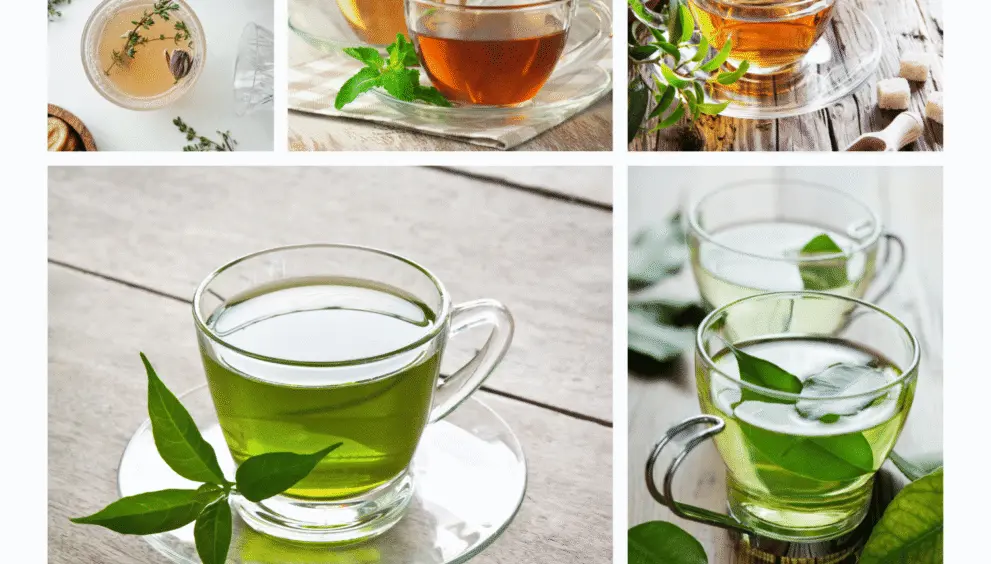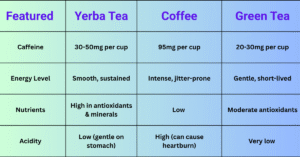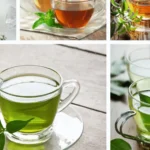After resting for many hours, we must consider which tea is best to drink in the morning. This question comes to my mind when I wake up.
The most important factor is preparing your body to dilute stomach acid to activate metabolism with warm glass water, and hydrate the whole body. Therefore, it is advisable not to drink tea on an empty stomach; there are three reasons for this advice from a doctor.
- stomach irritation
- headache
- Blocks the absorption of nutrients
After understanding the three reasons, I hope you will review your morning tea routine and adjust your morning structure because your stomach is a more important organ than the happiness of a tea lover. Rich nutritional food can’t be helpful when we eat in an unhealthy way. However, the same food, when combined with a proper routine and recommended method, can provide the best results.
Finally, when you get up in the morning after a long period of sleep, take a few steps, refresh yourself, and drink warm water. It provides better results for the stomach, and then make your favorite tea and drink it. Morning tea makes you happy.
Now, we come back to our topic. According to Vicki Shanta Retelny, “Tea is a plant-based beverage that has been shown to have many nourishing properties.” Tea contains polyphenols, which prove its benefits in medicine, but every functional beverage becomes harmful when its limits are crossed. In the subcontinent, Tea was initially reserved only for patients, but over time, it gained popularity, and everyone became a tea lover. Tea has a history and has brilliant memories in every century.
Importance of Morning Teas
Tea is a superior alternative to coffee; several factors contribute to its growing importance.
- Sustained Energy
Tea offers a combination of focused L-theanine and caffeine to help you stay calm and energized.
- Rich in Antioxidants
Polyphenols are also known as flavonoids are components of healthful beverages. They reduce damage from free radicals in the body and act as antioxidants.
- hydrating
Our body contains 60% water. Every type of tea is a mixture of water. However, tea can’t compare with water. We consume 8-10 glasses of water daily, but tea is also beneficial in maintaining hydration levels.
- Less caffeine than coffee
| Products | Caffeine In Milligrams |
| Coffee | 90-200 |
| Black Tea | 14-70 |
| Green Tea | 24-45 |
The amount of caffeine in coffee and tea is precise. How does caffeine damage our bodies?
Effects of Caffeine on our body
- Insomnia
- Tachycardia
- Frequent urination
- High blood pressure
- Anxiety
- Headaches
- Dehydration
- Irritability
- Fatigue
- Increased alertness
- Restlessness
- Boosts sports performance
- Caffeine could cause incontinence
- Decreased calcium absorption in the bones
- Heartburn
- Longevity
- Nausea and Vomiting
- Digestive Benefits
Tea is beneficial for the digestive system, offering numerous benefits for gut flora and reducing inflammation. According to The American Journal of Clinical Nutrition, “People who drink tea three times a week for 6 months have lower chances for cancer as compared to those who don’t drink tea.
How to Brew the Perfect Cup
A perfect cup of tea depends on several key factors, including the right leaves, the ideal water temperature, the correct brewing time, and the proper brewing method.
Ingredients
- High-quality Tea (black Tea, Green Tea, Oolong tea, White Tea, Herbal Tea)
- Water (use filtered water to avoid chlorine or mineral flavors; reboiled water loses oxygen)
- Right Temperature
| Tea Type | Water Temperature |
| Black Tea | 200–212°F (93–100°C) |
| Oolong Tea | 185–205°F (85–96°C) |
| Green Tea | 160–180°F (70–82°C) |
| White Tea | 160–185°F (70–85°C) |
| Herbal Tea | 200–212°F (93–100°C) |
- The right tea-to-water ratio
- Loose-leaf Tea: 1 tsp per 8-oz (240-ml) cup.
- Tea bags: 1 bag per cup.
- For stronger tea, add more leaves.
| Tea Type | Steeping Time |
| Black tea | 3-5 minutes |
| Oolong tea | 3-5 minutes |
| Green tea | 2-3 minutes |
| White tea | 4-5 minutes |
| Herbal tea | 5-7 minutes |
Best Tea to Drink in the Morning
Now, we will explore which tea is the best to drink in the morning. A warm and aromatic cup of tea is no alternative for you. Tea wakes you up and becomes a valuable aid on a hard morning. There are many teas available on the market, making it difficult for us to choose the perfect one for the morning. The answer is clear: it depends upon your needs.
We explore the best teas, their benefits, and more, making it easy to choose the one that’s best for you.
Best Morning Teas for a Strong Caffeine Kick
1. English Breakfast Tea
English breakfast tea is the most popular and consumed drink worldwide, which is made from a blend of Assam, Darjeeling, Ceylon, and Kenyan black teas (which have lower caffeine). This tea is more potent than black and herbal teas. It contains antioxidants. This tea is cultivated in India, Sri Lanka, and Kenya.
There is a difference between Earl Grey tea (a famous British morning tea) and English breakfast tea. English Tea can reduce the risk of diseases.
- Heart Diseases
- Stroke
- Cancer
- Diabetes
Why Drink English Breakfast Tea in the Morning?
- Strong caffeine kick (~40-60 mg per cup)
- Rich, malty flavor
- Boosts alertness
- It pairs perfectly with breakfast
How to Brew the Perfect Cup
Ingredients:
- 1 tea bag
- 1 teaspoon sugar (or lemon, optional)
- Freshly boiled water, 240 ml 205°F / 96°C
- Low-fat Milk
Direction
- First, boil water up to 96°C
- Keep the cup or pot near a high temperature for a long time
- Add a tea bag into a cup, dip for 2 minutes, and wait for the best taste
- Add milk and sugar as you need
Pro tips for enjoying English Breakfast tea
1. Classic British Style
Add whole milk with one teaspoon of sugar; it’s the best combination for scones, jam, or a full English breakfast.
2. Iced English Breakfast Tea
For a double-strength version, pour over ice and add lemon slices; this is best for a refreshing summer morning.
3. Tea Latte
During preparation, mix with steamed milk, similar to a London fog.
| Tea Type | Caffeine | Flavor | Best for |
| English Breakfast | 40-60 mg | Malty, Bold | Coffee Drinker |
2. Matcha (Ceremonial Grade)
Ceremonial-grade matcha is the highest quality green tea powder, made from young Japanese tea leaves, and is also used in traditional Japanese tea ceremonies. Young leaves contain a high amount of nutrients. Ceremonial-grade matcha can’t compare if you want calm alertness. Long-lasting energy and mental clarity. It provides a zen-like focus that coffee and regular tea can’t offer. Let’s explore more.
Factors that Make Ceremonial Grade Matcha Special
- Shaded for maximum nutrients
Before harvest, matcha leaves are covered for 21 to 28 days, which increases the levels of chlorophyll and L-theanine. Only the youngest and softest leaves are hand-picked.
- Ultra-Fine Powder
To produce matcha, the leaves are ground between stones to get ultra-fine powder.
Powder has 10x more antioxidants. Only 30 grams of matcha are produced per hour.
- Color: Bright, vibrant green
- Texture: Excellent, silky powder.
- Taste: smooth, rich, slightly sweet, and umami (savory), with no bitterness.
- Aroma: Fresh, grassy, and earthy.
- Use: primarily for drinking with hot water
Health Benefits:
- High in antioxidant compounds
Matcha contains a high amount of catechins, which act as natural antioxidants. It reduces free radical damage and prevents chronic diseases.
- It may help protect the liver.
Some studies have found that matcha may help your liver and decrease the risk of liver diseases.
- Boosts brain function
Matcha improves attention, memory, and reaction time. It contains caffeine and L-theanine, as I have explained before; these two compounds improve brain functions.
- It may help prevent cancer.
Several animal studies have proved that matcha compounds reduce the growth of cancer cells.
- It may promote heart health.
Green tea lowers blood pressure by improving endothelial function and reducing the risk of cardiovascular disease; matcha, ceremonial grade, is also prepared with green tea. It poses a lower risk for patients with blood pressure issues.
- Loose weight loss
It boosts metabolism. Green tea is beneficial for burning fat and promoting weight loss, and is also a popular ingredient in many supplements. If you take 500 mg of green tea for up to 12 weeks, your body begins to burn fat.
Prepare the perfect cup of Matcha Tea
Method 1. Usucha – Thin Matcha
Ingredients
- 1 tsp ceremonial grade matcha
- Bamboo whisk (chasen) or small frother
- 60 ml hot water (175°F / 80°C)
Direction
- Strain the matcha into a bowl to avoid clumps.
- Add hot water (just boiling).
- Shake vigorously in a “W” or “M” motion until foamy.
- Drink immediately (no need to steep!)
Method 2 Modern Matcha Latte
- Stir one tablespoon of matcha with 2 ounces of hot water.
- Add 6 ounces of steamed milk (dairy or oat milk works best).
- Sweeten lightly with honey, if desired.
Matcha vs. Coffee vs. Regular Green Tea
| Featured | Matcha | Coffee | Regular Green Tea |
| Caffeine | 30-40mg (slow release) | 95mg (fast spike) | 20-30mg (mild) |
| Energy Feel | Calm, Focused | Jittery, Anxious | Gentle, Short life |
| L-Theanine | High (Relaxes The Mind) | None | Small Amount |
| Antioxidants | Extremely High | Low | Moderate |
Best Ceremonial Grade Matcha Brands
- Ippodo
- Encha
- Archaeologist
Who Should Drink Matcha?
- Students & professionals
- Yoga/meditation lovers
- Coffee quitters
- Health enthusiasts
Best Teas for Smooth, Jitter-Free Energy
A. Darjeeling Tea
Darjeeling Tea is renowned for its distinctive flavor, often referred to as the champagne of teas. It is harvested and manufactured in Darjeeling, West Bengal, Western India. It’s a type of black Tea and has a fruity aroma and golden color. Experts say it has citrus fruit and flower flavors.
Health Benefits
- Boost heart health
Darjeeling Tea contains theaflavins and thearubigins that can lower cholesterol levels. High cholesterol levels increase blood pressure, which may cause heart attacks. This Tea reduces the risk of this kind of disease.
- Fight cancer
Research has found two powerful antioxidants, theaflavins and thearubigins. Free radicals damage cell DNA, but theaflavins and thearubigins protect against these damaging effects. Polyphenols shrink cancer tumors and protect them from ultraviolet rays.
- Improve gut health
Harmful bacteria may cause you to become overweight, or good bacteria may help you lose weight. The polyphenols in Darjeeling tea increase the growth of good bacteria in the digestive system. As this Tea helps to improve our gut health, it is one of our body’s essential functions.
- Prevent cavities
Black tea compounds slow down bacterial growth. Tea balances your mouth microbiome and decreases bad breath. Black Tea can stain the enamel. Doctors recommend 1 or 2 cups per day, preferably with milk.
- Nutrition Amount
One teaspoon of Tea combined with a cup of water contains
| Calories | 0 grams |
| Protein | 0 grams |
| Fat | 0 grams |
| Carbohydrate | 0 grams |
| Sugar | 0 grams |
| Fiber | 0 grams |
6.Help lower blood sugar levels.
Why Darjeeling Tea is Perfect for Gentle Energy
- Lighter caffeine (30-50 mg per cup )
-
Elegant Flavor Profile
-
Balanced by Natural L-Theanine
-
Let’s brew a cup of Darjeeling tea.
Ingredients
- 1 teaspoon loose-leaf Darjeeling tea
- 240 ml of water at 185–195°F (85–90°C)
- A drizzle of honey (optional)
Direction
- Heat water to just below the boiling point (never use a rolling boil).
- Steep for 3–4 minutes (longer steeping times result in increased astringency).
- Strain leaves to prevent bitterness.
- Sip it plain to appreciate its natural complexity.
Pro Tips
- Avoid milk because it overpowers Darjeeling’s flavor
- Buy FTGFOP (Finest Tippy Golden Flowery Orange Pekoe) grade for premium quality.
Darjeeling vs. Other Morning Teas
| Tea | Caffeine | Flavor | Best For |
| Darjeeling | 30-50 mg | Floral, fruity, Smooth | sophisticated lift |
| English breakfast | 40-60 mg | Malty, bold | Coffee-like strength |
| Green | 20-30 mg | Grassy, vegetal | Gentle detox |
| Oolong | 30-50 mg | Creamy, orchid-like | Balanced energy |
Best Darjeeling tea brands
- Thunderbolt Tea (Single-estate, fresh harvests)
- Makaibari Estate (Biodynamic, exquisite muscatel flavor)
- TWG Darjeeling (Luxury blend, consistent quality)
Who should drink Darjeeling Tea?
- Tea connoisseurs who appreciate terroir-driven flavors.
- Former coffee drinkers want a gentler alternative.
- Afternoon tea lovers pair it with scones or light pastries.
B. Yerba Mate
Yerba mate is an herbal tea pronounced “MAH-tay.” Which is made from dried leaves of the Ilex paraguariensis plant. This tea contains compounds that are nutrition-rich and help our body enhance performance.
Types of Yerba Mate
| Types | Flavor Profile | Best For |
| Traditional | Earthy, robust, smoky, Purists | traditionalists |
| Flavored | Citrus, mint, berry-infused | beginners, iced mate |
| Organic | Clean, pure taste | Health-conscious drinkers |
| Brazilian (Chimarrão) | Bright green, grassy | Those who prefer a milder taste |
Health Benefits
- Rich in antioxidants and nutrients
- It can boost energy and improve focus
- Enhance physical performance
- Protect against infection
- Help lose weight and belly fat
- Lower blood sugar level
- Lower heart disease
- May reduce inflammation
- Improve digestive and metabolic support
How to Brew a Perfect Cup of Yerba Mate
Traditional Method
Ingredients
- Yerba mate leaves (loose)
- Mate gourd (calabash or wooden)
- Bombilla (metal straw with filter)
- Hot water (150-180°F / 65-80°C)
Directions
- Fill the gourd 2/3 full with yerba mate.
- Tilt the gourd to one side, creating a slope.
- Insert the bombilla into the space.
- Pour cool water first to moisten leaves (prevents burning).
- Add hot water (not boiling!) and sip through the bombilla.
- Refill with water 10-15 times until the flavor fades.
Latest Brewing Method
- For French press, Steep one teaspoon per cup for 3-5 minutes
- For Tea Bags, Convenient but less authentic flavor
- Cold Brew: Steep overnight for a refreshing iced version
- Comparison of Yerba Mate, Coffee, and Green Tea
Top Yerba Tea Brands
- Cruz De Malta (Best Yerba Mate For Beginners)
- Ximango
- La Rubia (for brewing cold)
- Canarias (Uruguay’s Most Popular Brand)
- CBSe (Best Flavored Yerba Mate)
Who Should Drink Yerba Mate?
- Coffee drinkers want a gentler alternative
- Students & professionals needing long focus sessions
- Athletes looking for natural endurance support
- Health enthusiasts seeking nutrient-rich beverages
Best Teas for Digestion & Metabolism
A. Ginger Tea
Ginger tea is prepared from the dried root of Zingiber officinale, a naturally caffeine-free tea. It contains gingerol, which is used in Ayurvedic and Traditional Chinese Medicine. You can also call it natural Tea because all its ingredients are natural and free from impurities. Now, we will explore ginger tea together.
Why drink ginger tea, and what are its benefits?
- Instant Digestive Relief
Ginger tea can help alleviate morning sickness, motion sickness, and chemotherapy side effects. It also stimulates digestive enzymes and provides an anti-inflammatory effect on the gut lining.
- Metabolism & Circulation Boost
This Tea is particularly beneficial for diabetic patients because gingerol helps the body use insulin effectively, as blood sugar levels are reduced, and may aid in weight loss.
- Immunity & Cold Fighter
Ginger tea has antiviral properties, helping to alleviate symptoms of the flu and cold. It breaks down mucus and warms the body to reduce fever.
- Contains gingerol
Gingerol is a bioactive compound. It has properties that provide anti-inflammatory and antioxidant effects. It provides an environment that reduces oxidative stress.
How to Make Perfect Ginger Tea
Fresh ginger
Ingredients
- 1 teaspoon fresh ginger (thinly sliced or grated)
- 1.5 cups water
- Optional: Lemon, honey, turmeric, or mint
Direction
- Simmer ginger in water for 5-10 minutes (longer = spicier).
- Strain into a cup.
- Add lemon/honey if desired.
Variations
- Golden Milk Ginger Tea: Add turmeric + black pepper + coconut milk
- Spiced Ginger Tea: Cinnamon + cloves + cardamom
- Iced Ginger Lemonade: Chill, add honey, and sparkling water
Ginger Tea vs. Other Digestive Teas
Here is a comparison between digestive teas to share more information with an easy method
| Teas | Best For | Taste | Caffeine |
| Ginger | Nausea, inflammation | Spicy, warming | No |
| Peppermint | bloating | Cool, minty | No |
| Fennel | Gas | Sweet | Licorice |
| Chamomile | Stress-induced indigestion | floral, mild | No |
Who should drink ginger tea?
- Morning drinkers (to start digestion for the whole day )
- Travelers (to prevent motion sickness)
- Fitness enthusiasts (to reduce muscle pain)
- Cold/flu sufferers (clears sinus congestion)
Cautions
- I recommend only three cups per day
- You should avoid it if you have a blood thinner
Best Ginger Tea Brands
- Traditional Medicinals (Organic, strong spice)
- Yogi Ginger Tea (Blended with lemongrass)
- Pukka Three Ginger (Turmeric + galangal boost)
I don’t recommend these brands. Get maximum benefits; fresh ginger always beats tea bags easily.
B. Pu-erh Tea
Pu-erh tea, pronounced as poo-air. This Tea is a unique, fermented tea harvested in Yunnan, China. As its age increases, the taste improves, much like wine or cheese. It is made from a “wild old tree.” People drink this Tea to get health benefits. Pu-erh tea is divided into two types.
- Sheng (Raw) Pu-erh
- Shou (Ripe) Pu-erh
| Types | Raw (sheng) | Ripe ( shou ) |
| Process | Naturally aged | Pile-fermented (wo dui) |
| Aging | 10-30 years | Reading in months |
| Flavor | Bright, mellow, Earthy, | smooth |
| Color of brew | Golden yellow | black |
Health Benefits
- It may promote weight loss
- Improve cholesterol
- It may boost liver health
- Inhibit cancer growth
- Gut Health
- Mental alertness
Brew a perfect cup of Pu-erh Tea like a tea master.
Traditional Method:
- Rinse (5 sec with boiling water)
- Gongfu Style:
- 5g tea/ml water
- 15s → 20s → 30s (up to 15 steps)
- Grandpa Style:
- 3g in the mug, keep adding water
- Water Temp:
- Young sheng: 90°C
- Aged/ripe: 95-100°C
Pu-erh Market Guide
Counterfeit Alert:
- Fake “aged” labels (verify harvest year)
- Artificial coloring (real pu-erh darkens naturally)
Best Producers:
- Dayi (Menghai Factory)
- Xiaguan (Military cakes)
- Chen Sheng Hao (Premium aged)
Storage Tips:
- Keep at 25°C, 60-70% humidity
- Never refrigerate (kills fermentation)
Modern Uses of Pu-erh Tea
- Cooking
- Skincare
- Mixology
Did You Know?
1000g of pu-erh tea sells for $10,000!
Who Should Drink Pu-erh?
- Tea collectors
- Health-seekers
- Gourmets
Summary
Start your significant day with the right cup of tea to feel better physically and mentally. I have explored every type of tea you need in the morning, including its benefits and how to brew a cup of tea with nutrition stats. On an empty stomach, you don’t become careless; you should care about yourself. First, drink water to maintain your hydration level. Now, you can decide according to your needs. Tea has less caffeine than coffee. Tea also has side effects; everything remains useful with its limits.
FAQs
- What is the best tea to drink in the morning?
The best morning teas are English Breakfast (for strong caffeine), Matcha (for sustained energy), Ginger tea (for digestion), Yerba Mate (coffee alternative), or Darjeeling (gentle energy)
- What is a good, healthy morning tea?
Top healthy options are Green tea (antioxidants), White tea (low caffeine, high antioxidants), Rooibos (caffeine-free, rich in minerals), and
Tulsi/holy basil (adaptogenic benefits)
- Which tea is good in the morning instead of coffee?
The best coffee alternatives are Matcha (calm energy)
Yerba Mate (similar to caffeine without a crash), Black tea (Assam or Ceylon), and Pu-erh (earthiness like coffee)
- What is the best breakfast tea?
Classic breakfast teas are English/Irish Breakfast blends, Assam black tea, Earl Grey (bergamot flavor), and Masala chai (with spices)
- What is the healthiest morning drink?
The healthiest options in order are Warm lemon water and green tea/matcha
Herbal infusions (ginger/turmeric) and Black tea (in moderation)
- What should I drink every morning on an empty stomach?
The best first drink is warm water with lemon. Or
Aloe vera juice as a digestive aid. You can also try Coconut water (electrolytes) or significantly diluted apple cider vinegar.
- What tea should I drink for the first time?
You can drink Jasmine green tea (floral and mild), Chamomile (gentle, caffeine-free), Rooibos (naturally sweet), or Earl Grey (approachable black tea)




